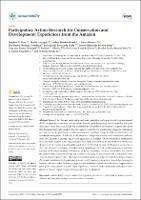Mostrar el registro sencillo del ítem
Participatory action research for conservation and development: Experiences from the Amazon
| dc.contributor.author | Perz, S.G. | |
| dc.contributor.author | Arteaga, Marliz | |
| dc.contributor.author | Baudoin, Farah A. | |
| dc.contributor.author | Brown, I.F. | |
| dc.contributor.author | Huaman Mendoza, Elsa | |
| dc.contributor.author | de Paula, Y.A.P. | |
| dc.contributor.author | Perales Yabar, Leonor Mercedes | |
| dc.contributor.author | Santos Pimentel, Alan | |
| dc.contributor.author | Ribeiro, Sabina C. | |
| dc.contributor.author | Rioja-Ballivián, G. | |
| dc.contributor.author | Rosero Peña, Martha | |
| dc.contributor.author | Sanjinez L., L. Cecilia | |
| dc.contributor.author | Selaya G., N. Galia | |
| dc.date.accessioned | 2022-01-24T21:14:24Z | |
| dc.date.available | 2022-01-24T21:14:24Z | |
| dc.date.issued | 2022-01 | |
| dc.identifier.uri | https://hdl.handle.net/20.500.12542/1718 | |
| dc.description.abstract | Research that features participation and action orientation, such as participatory action research (PAR), is especially valuable in contexts where there is rapid change, high social inequality, and great uncertainty about the future, which drives stakeholder demands for information to support their goals. The Amazon offers such a context, for it is a region where diverse stakeholders engage in contestation over environmental governance to address issues such as climate change to achieve conservation and sustainable development. Stakeholder mobilization has changed the terms by which research is conducted, from the definition of priority topics to the application of findings. Due to stakeholder mobilization, more and more research in the Amazon is now necessarily participatory, for stakeholders routinely issue demands about how the research will be conducted and for what purpose. In this paper, we provide an overview of several experiences of implementing methods such as PAR by different teams or networks, focusing on the complementary contributions of outside researchers and local stakeholders. The heart of the paper reports on three broad types of experiences focusing on conservation and development in the Amazon: (1) participatory data collection for co-production of knowledge for environmental governance, (2) inclusive environmental monitoring systems, and (3) innovative models of knowledge exchange to facilitate collective action. Within each type, we report multiple experiences with distinct approaches to participation and action in research. These experiences constitute models that can be replicated in other places for broader impact to support conservation and development | es_PE |
| dc.format | application/pdf | es_PE |
| dc.language.iso | spa | es_PE |
| dc.publisher | MDPI AG | es_PE |
| dc.relation.uri | https://www.mdpi.com/2071-1050/14/1/233 | es_PE |
| dc.rights | info:eu-repo/semantics/openAccess | es_PE |
| dc.rights | Atribución-NoComercial-SinDerivadas 3.0 Estados Unidos de América | * |
| dc.rights.uri | http://creativecommons.org/licenses/by-nc-nd/3.0/us/ | * |
| dc.source | Repositorio Institucional - SENAMHI | es_PE |
| dc.source | Servicio Nacional de Meteorología e Hidrología del Perú | es_PE |
| dc.subject | Sustainability | es_PE |
| dc.subject | Governance | es_PE |
| dc.subject | Development | es_PE |
| dc.subject | Conservation | es_PE |
| dc.subject | Participatory Action Research | es_PE |
| dc.subject | Amazonia | es_PE |
| dc.subject | Evaluación de la Sostenibilidad | es_PE |
| dc.subject | Conservación del Medio Ambiente | es_PE |
| dc.title | Participatory action research for conservation and development: Experiences from the Amazon | es_PE |
| dc.type | info:eu-repo/semantics/article | es_PE |
| dc.identifier.doi | https://doi.org/10.3390/su14010233 | |
| dc.identifier.journal | Sustainability | |
| dc.subject.ocde | https://purl.org/pe-repo/ocde/ford#1.05.08 | es_PE |
| dc.subject.sinia | conservacion de los bosques - Biodiversidad y Ecosistemas | |
| dc.type.sinia | text/publicacion cientifica | |
| dc.identifier.url | https://hdl.handle.net/20.500.12542/1718 |
Ficheros en el ítem
Este ítem aparece en la(s) siguiente(s) colección(es)
-
Artículo científico [171]









